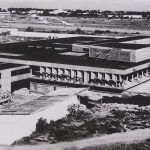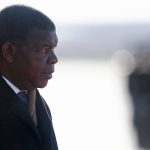Nazar translates Angola’s recent history into sound
As a way of coping when a child, Nazar would express his loneliness and fear in sound. So it was only natural that this would progress into his style when he began making music as an adult.
Author:
16 April 2020

From the get-go, the squelch of the acid bass synth is front and centre. It’s a dangerous, scuzzy, jittery, organic thing and feels sharp enough to cut you.
Drones swarm in, amping up the tension. This is anxiety in pure sonic form. Then the beat drops, deep, thudding and not too distant from South Africa’s gqom.
Arms Deal is the kind of song you don’t want to meet in a dark alley. Its bass pins the listener to the wall, while the drums take pot shots at the head.
“I need to corner the listener and then switch off and close the windows,” says Angolan producer Nazar by email from his home in Manchester, England. “I have a set of sounds that I tend to always incorporate when the goal is to trigger those sensations for the listener. Gun cocks, unusual metallic sounds, playing a lot with panning and space.”
The sense of dread, claustrophobia and tension is palpable on Nazar’s debut album, Guerilla. His “fascination” for these obscure elements comes from his childhood. “Loneliness was a constant feeling for me,” he says. “With loneliness, comes fear.”
As a way of coping he would “bathe in it”, materialising this fear in sound. “So it makes sense that when I started to make music, sounds of this nature would define my style, quite naturally.”
Real-life arms deal
Nazar says Arms Deal is a “controversial” song. “It’s about information that I prefer to keep on hold for now,” he says. “It’s a certain event and literally about an arms deal.”
In Angolan history, there are so many arms deal stories. In the 1970s and 1980s, the country was used as a global weapons testing ground so technologies could attain the stamp of battlefield tested.
Related article:
Both Nazar’s parents were National Union for the Total Independence of Angola (Unita) soldiers and it was Unita leader Jonas Savimbi who said in October 1975, “Where are we going to end? We will be instruments of those who manufacture guns.” Apartheid South Africa was one of Unita’s sources for arms.
The country has a bloody history of weaponisation and in making music Nazar speaks of a weaponisation of another kind, to “weaponise kuduro”, the globally famous Angolan dance music genre.
Making kuduro a weapon
In April 2015, the Generation Bass record label released a free download, the three-track Nihil EP by a new artist called Nazar, a London-based Angolan who described his sound as “rough kuduro”.
With a title riffing off nihilism, Nazar said at the time that his EP explored the “rawness and extreme violence” of the 27-year Angolan civil war. It did this by translating the subject matter into “imperfect distorted frequencies” and a “more brutal, honest sound” to communicate emotions such as fear, anxiety, hatred, arrogance and hubris.
With song titles like Hate and Massacre, it was clear Nazar was not offering up any standard idea of kuduro music. It might have been a jumping off point but this sound, closer to industrial music, felt like it could strip you to the bone.

Nazar’s sound appeared to share similarities with the emerging batida and tarraxo sounds in Lisbon, Portugal, which drew from Angola’s kuduro and tarraxinha genres. But it also felt similar to proto-industrial producers such as Throbbing Gristle, Cabaret Voltaire and Adrian Sherwood.
The tarraxinha-fuelled 10 000 Africans offered the only glimpse of respite on the EP until it, too, exploded into anxiety-drenched dance floor glory.
The Nihil 2 EP followed in 2016, with the fractured squelch of Oligarch’s Son, which morphs into an aggressive dance floor deconstruction halfway through. This time Nazar’s focus was on present-day Angola and the “hubris of a ruling class that continues to illegitimately perpetuate its power in a legacy that stretches back 40 years”.
Nazar describes those early releases today as establishing “the blueprint” for what would become his 2018 Enclave EP and 2020 album Guerilla on Hyperdub, his new label.
“Without them, I wouldn’t exist,” he says.
‘Deconstructed collective memories’
By the time Enclave came out, it was clear that Nazar had grown as a producer. His sound was fuller and richer, and it wasn’t aimed at your throat all the time. There were more moments of respite and Nazar’s use of vocal samples was more pronounced.
The track Ceasefire was a perfect example of a piece of mesmeric sound design more than any traditional idea of song. Understanding Nazar’s music, it is key to know that he eschews traditional ideas of songwriting, with sound design a much more important element of the mix than melody.
“It makes sense to me to approach things more visually because of the nature of my inspiration, which is deconstructed collective memories,” says Nazar. Drawing from these collective family sources of memory is a “complex process” and needs to be done with time, so it can all be processed.
Related article:
Through returning to live in Angola for a while, he managed to gain a fuller understanding of the after-effects of the civil war. “It was exciting and terrifying at the same time. I had all these misconceptions about Angola. But the thing is, Angola is like any other place on Earth, amazing things next to not-so-amazing things,” he says. “It was just harder because I hadn’t grown up there. But I was always confident that with enough time spent there, I would feel at home. And I did, and I do.”
Nazar would document these experiences sonically while on holiday in Angola with his family. “We would go to the central highlands and I would take my recorders with me to capture the essence of place,” he says. “I’d find peace.”
He adds: “I had to find the answers first, as a member of this community and member in my family, only then converting it into sound waves.”
Sanctions are personal
Nazar says Guerilla is “naturally more about the aftermath of the Angolan civil war”, because it’s “where he stands in the timeline”. But his family’s history is woven into the album, on the fuzzed-out Diverted his father reads from his war journal, while a kick drum and razor-sharp snares slice out a rhythm. This is a bush war translated to the dance floor.
Mother offers up gorgeous synth melodies floating over a backwards loop and bird-tweet samples, creating a dream world, a moment of fractured bliss. This is a world that psychedelic sonic painters such as Animal Collective inhabit.
Nazar never starts with a melody when composing. He says a process of “incessant experimentation” leads to textural pieces or “unusual patterns” and it is from these that he starts to build a song.
“Melody will sometime just come after the song is completed,” he says. “After I think that I’ve completed a track, a few days later I will revisit the project just to add a melody. When a song UN Sanctions or Why gets added a new layer of melody, that’s when the listener will be comfortable enough in that crapped up space and start seeing better.” Nazar says this is the moment when “beams of light emerge”.

Listening to Why, it’s difficult to imagine this fractured track that references 1990s breakbeats without the rave-synth melody that rides atop it.
UN Sanctions comes on like a fractured slab of aggression, but as it plays you begin to notice how it is a vehicle for a dialogues between Angola’s kuduro and Chicago’s footwork genres.
Nazar was born on 15 July 1993, the day the United Nations first imposed sanctions against Unita. “UN Sanctions is about a moment where the war had impacted me directly,” he says. “Years later, when I had gotten a bit of age, I started to feel the effect of successive sanctions, the lack of opportunities to see my dad, the increased difficulties my mother had in providing us food.”
Global citizen
As for the footwork and gqom references, Nazar says he hears this music everywhere when he is out in the clubs of the United Kingdom. “I can’t say that I directly seek inspiration from it, but they do affect me in many ways.”
Nazar released 2 African Sickos, a collaboration with South African gqom star Citizen Boy, on music-sharing website SoundCloud in October 2019. The song is a tension-laden, adrenaline-fuelled, dance floor construct that begs for further collaboration, which Nazar says might happen.
“As an African, it’s my duty to enrich our cultures through collaboration,” he says. “I’ve always appreciated the South African scene, since back when I was living in Angola, long before gqom brought the attention of the world.”


